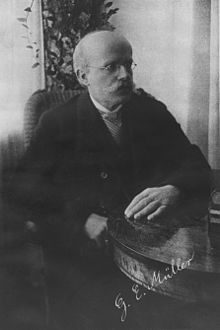Georg Elias Müller
| Georg Elias Müller | |
|---|---|

Georg Elias Müller
|
|
| Born | 20 July 1850 Grimma, Kingdom of Saxony, German Confederation |
| Died |
23 December 1934 (aged 84) Göttingen, Germany |
| Nationality | German |
| Fields | Experimental psychology |
| Institutions | University of Göttingen |
| Alma mater |
Leipzig University University of Göttingen (Dr.phil., 1873) |
| Thesis | Zur Theorie der sinnlichen Aufmerksamkeit (On the Theory of Sensory Attention) (1873) |
| Doctoral advisor | Hermann Lotze |
| Doctoral students | Géza Révész |
Georg Elias Müller (20 July 1850 – 23 December 1934) was a significant early German experimental psychologist who is credited with the theory of retroactive interference.
Georg Elias Müller was born in Grimma, Saxony on 20 July 1850 to August Friedrich Müller and Rosalie Zehme Müller. His father was a theologian and professor of religion at a nearby royal academy. His family was deeply involved in a revivalist orthodoxy (Neuluthertum) that he eventually broke away from. As a child he attended the Gymnasium at Leipzig.
At 18 he attended Leipzig University where he studied history and philosophy, while there he was inducted into Herbartian Philosophy. He was always seen as studious and had an interest in Mysticism that he fulfilled by reading Goethe, Byron, and Shelley. Müller had difficulty deciding between history or philosophy, in order to make his decision he took two years off from Leipzig. During those two years, starting in 1870 he entered the German army as a volunteer, and took part in the Franco-Prussian War. He decided on philosophy which led him to the study of psychology.
He started out with more of a focus in the humanities and studied philosophy and history. Though Müller does not share much of the same views as Hermann Lotze he credits him with his push towards psychology, research and critical thinking.Gustav Theodor Fechner, his first teacher at Leipzig University also introduced him to psychophysics and another teacher, Moritz Wilhelm Drobisch sent him to the University of Göttingen to study with Lotze and to facilitate his career. Lotze first exposed Müller to scientific psychology.
He completed his doctorate in 1873 under the supervision of Lotze at Göttingen. In April 1881 he succeeded Lotze's position at Göttingen as privatdozent and established one of the first few experimental psychology laboratories in the world. He remained privatdozent for 40 years. Müller was primarily an experimental psychologist, often working in the laboratory and performing rigorous experimental investigations. He was particularly prominent in reaction time research, as well as psychophysics and color theory. He is credited with a portion of the interference theory, retroactive interference, a theory that is still prominent in modern times. While at Göttingen he also lectured on these topics: Psychophysical Method, Memory, and The Phenomena of Violition. Müller also invented the memory drum; a device used for verbal learning research.
...
Wikipedia
